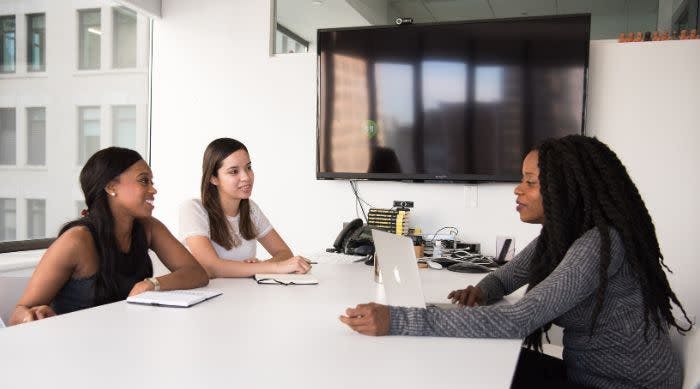I left the corporate world in favor of a remote work environment as a contractor after exactly one decade. While I am grateful for everything I learned, it was obvious to me that the world of work is changing and the future of work is different from what we've assumed.
It started slow. Employers were beginning to open up to the idea of working from home when there was a personal issue involved. After a while, a lot of job postings began including the possibility of working from home on Fridays, for example. However things changed drastically with the pandemic. It made us change our perspective - working remotely full time is possible and even more so at times more productive!
Since joining MVP Match I have spoken to a lot of people, from all sides of technical freelance, that were in the same sentiment as I was when I left my last job. When asked, "Why freelance?" The answer was along the same lines: "I've discovered I can spend more time with my family or focus on myself while still delivering at the same quality, if not better". The pandemic made it possible for a lot of us to make this switch – while freelance has been a valid mode of work for quite a while now, we see that more and more companies are opening up to this movement. But it is just the beginning and the culture surrounding remote work and freelance is just taking shape.
We are all learning together – recruiters, corporations and freelancers alike.
Independent technical freelancers have "been there, done that." It's quite a common thing in the start-up and scale-up space. But as more and more companies with a "perm work" culture are opening up to project and freelance work, there are some things to keep in mind.
Fast feedback is the way to go!
Technical freelancers are in a privileged position to choose the clients they work with. When speaking to our talent, I ask them if they are involved in other interviewing processes, and most of the time they are. When hiring freelancers, you need to keep that in mind and maybe adjust the interviewing process. Set aside some slots in your calendars and make sure you are ready to make a decision quickly. Fast feedback is the way to go! Set up and inform them of the decision making process and rounds, keep them engaged at every step. It is often not a problem if something changes or you need more time. But if you fail to communicate that to them, they might not wait for your decision. This often works both ways. If they cannot wait, then they can let you know in time and you would not have lost all the time you would have invested.
Don’t sacrifice speed for quality
No matter if you need a freelancer in a leading position or more execution focused, they will still be part of your team, and it is important to have someone you can connect with, communicate openly with, that understands your company’s vision. So while it is important to make decisions in a timely manner, do not lower the quality of your process or your standards.
Finding the right match is equally important. Spend some time at the beginning of the process to map out the skill set you need, and it will shorten your hiring timeline by a lot. Plus it is much less stressful to see a few good people than it is to interview a lot of them. Clearly determine the technical skills they must have, and what other relevant past experience they need to possess (example: clear experience with migrations or payment method integration). Also understand what knowledge is not the most necessary but having it would put a candidate at the top of your list (example: previous fintech experience). That way, you can find a way to prioritise candidates in a way that even if the ones that tick all the “nice-to-have” boxes do not work out, you still end up with a freelancer that you are happy with.
One other thing to consider is their communication style: If you want someone who has experience mentoring or working with juniors, or if you want someone who can step into a leadership position should it be needed.
A smooth onboarding will help both parties
Training and onboarding is easier with a freelancer. They already know the job – they just need to know the product. When hiring a freelancer, set some time at the beginning to let them get to know the team, the product, your goals, what challenges you face. It might seem redundant to make them part of the team for a short period of time, but their experience makes them a great sparring partner and co-worker as they bring in invaluable knowledge (Also, “conversations by the water cooler” with them are amazing!). Ask them for their ideas and input. Most of the time they will be able to find easy solutions to problems or blockers or give you a better view on timelines. They have worked in a number of different industries and with a lot of different people, and this experience, besides making them adaptable, is a pretty neat bonus. Take advantage of that knowledge.
Feedback is key
Keep communication open. Freelancers also need feedback and guidance. In the end, the product is yours, and it needs to be delivered to standard. Revisions and tweaks are part of the normal process – they might have been unsure of the requirements or uncovered that they need more information. An environment that encourages communication and asking questions (on both sides) ensures that the end result is exactly what you wanted. It’s also important to provide positive feedback during the course of the project. These words of encouragement are not only good for confidence but also inform the freelancer of what you would define as success.
A proper off-boarding will help determine your next steps
A good thing is to also set some time for off-boarding. Ask all your “what if?” questions. Make sure that when they leave, all your questions are answered. Go over the project one more time, what went wrong, what went right, and allow the team that remains to get as much insight as they need to keep things going smoothly. During the off-boarding, it is also crucial that you have a handover plan. It is important that the process and learning remain in-house or are accessible when you decide to extend the project.
We hope this article helps you with your future hiring needs. Being the intermediary between clients and freelancers we have seen both parties face a unique set of challenges. We hope that these tips can help you make the process smoother when working with your next remote freelance talent. Stay tuned to learn some of the ways that even the most experienced and well-versed freelancers can improve their and processes to get the most out of their freelance career.




